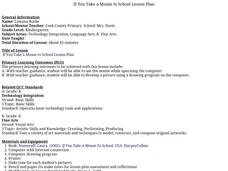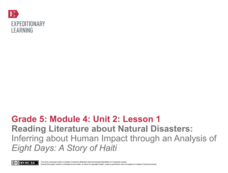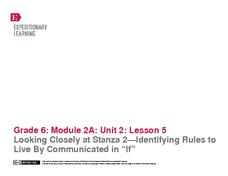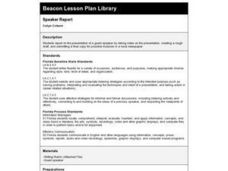Curated OER
Comprehension-Note Taking Skills to Supprt Opinions and Panel Discussion
Fifth graders examine note taking skills in order to support opinions. In this language arts lesson, 5th graders read several newpaper articles and discuss a current issue. Students explore how to paraphrase so as not to commit plagiarism.
Curated OER
Summarizing
Students use their note-taking skills to write summaries of information. In this writing skills lesson, students use the notes they have taken in another lesson to write adventure stories by implementing the Rule-Based strategy.
Curated OER
If You Take a Mouse to School Lesson Plan
The book If You Take a Mouse to School is sweet, enjoyable, and so fun to read. Little learners hear the tale of Mr. Mouse and all the trouble he causes. They discuss the book as a large group and then split up into smaller groups to use...
Curated OER
Revive Reviews With Student-Created Study Guides
Learners work cooperatively in small groups to practice note-taking and outlining skills which are applied as student create unit Study Guides for their classmates. They demonstrate critical thinking skills as they decide the most...
Museum of Disability
Taking Visual Impairment to School
What is the world like when you can't see, or when your vision is impaired? Learn about how Lisa communicates with the world around her with Taking Visual Impairment to School by Rita Whitman Steingold. Learners answer discussion...
Curated OER
Note taking on Sources Other Than Text
Students examine different sources of information. They evaluate and take notes from a variety of sources.
Curated OER
How to Take Notes
Pupils practice taking notes while reading their textbooks. For this note taking lesson, students read a text and use the given procedure to take notes for the text.
EngageNY
Reading Literature about Natural Disasters: Inferring about Human Impact through an Analysis of Eight Days: A Story of Haiti
This is a disaster. Scholars look through the book Eight Days: A Story of Haiti and discuss their wonderings about the text and natural disasters. They then complete a first read to determine gist and second read to answer text-dependent...
EngageNY
Reading Informational Text for Details: Meg’s Rainforest Experiment (Pages 17–20)
Take good notes. Scholars record information in their note catcher sheets as the teacher reads aloud pages 17-20 of The Most Beautiful Roof in the World. Learners then reread parts of the text in groups and rotate to share the notes they...
EngageNY
Looking Closely at Stanza 2—Identifying Rules to Live By Communicated in “If”
Pupils take part in a close reading of the poem, If by Rudyard Kipling, in which they delve deep into its meaning and identify its rules to live by. As the grand discussion progresses, learners then relate the poem's rules with those...
EngageNY
Launching To Kill A Mockingbird: Establishing Reading Routines (Chapter 1)
Scholars use a Story Impressions Note-catcher to capture their first impressions of words or phrases from To Kill a Mockingbird. They then listen to a reading of the first six pages of the novel before the teacher asks questions to check...
Read Write Think
Book Report Alternative: Rewind the Plot!
Have you ever looked for a new way to teach an old concept? Scholars thinking about the rising action of a story in a whole new perspective. However, Book Report Alternative: Rewind the Plot! challenges readers and allows for much...
NASA
Hurricanes and Hot Towers with TRMM
Take cover because a wild presentation on hurricanes is about to make landfall in your classroom! An outstanding PowerPoint presentation is the centerpiece of this lesson. Not only does it provide information and photographs, but several...
EngageNY
Conducting Research: Asking and Answering our Questions about Rainforest Arthropods
Let's ask an expert. Scholars divide into groups to research and become experts on either ants or butterflies. Learners use task cards and text on their topic to complete a note catcher. At the end, they share their information with a...
EngageNY
Conducting Research: Analyzing a Variety of Sources to Capture Information about My Insect
From picture to words. Scholars analyze a picture of an ant and then list two facts they observed and any questions that may arise. Expert groups from the previous instructional activity then look at a diagram about either an ant or...
EngageNY
Researching about the Red Cross, Continued: How Did the Red Cross Aid Haiti After the 2010 Earthquake?
What a puzzle! Scholars participate in a Jigsaw discussion within their expert groups, determining the gist of an article about the 2010 Haiti earthquake. As they read and discuss the article, they record thoughts on their note catchers.
Workforce Solutions
Thank You Letters
An important step in the job search process is sending a thank you note to any professional that has been of help. First, pupils discuss the etiquette of thank you notes, then draft a practice letter.
EngageNY
Looking Closely at Stanza 3—Identifying Rules to Live By Communicated in “If”
Just as Bud, from the novel Bud, Not Buddy by Christopher Paul Curtis, had rules to live by, so does the poem, If by Rudyard Kipling, but how do the two relate? Pupils delve deep into the poem's third stanza, participate in a grand...
EngageNY
Mid-Unit 3 Assessment, Part I: Short Constructed Response and Organizing Notes for a Public Speech
It's time to put pen to paper. Scholars complete the first part of the mid-unit 3 assessment, writing a short constructed response about international aid following a natural disaster. Next, pupils use informational texts and note...
Pulitzer Center
Peacebuilding: Taking Home Lessons Learned in Africa
Learners take a closer look at one journalist's work on UN Peacebuilding efforts in four African nations: Sierra Leone, Burundi, Central African Republic, and Guinea Bissau. They collaborate to define peacebuilding and discuss the...
Teach Engineering
Take Off with Paper Airplanes
Let's go fly a kite ... oops, a paper airplane! The 13th segment in an aviation unit of 22 relates the parts of an airplane to paper airplanes. Pupils learn the functions of the control surfaces of a plane to really make their knowledge...
EngageNY
Notices, Wonders, and Vocabulary of the Third Stanza of “If”
How does one's experience reading a poem's text differ from listening to its audio version? Delve into the insightful question with the poem, If by Rudyard Kipling, as pupils compare and contrast their experience using a note-taking...
Curated OER
How to DO Just About Anything
Learners discover how to use a digital camera and how to make a PowerPoint presentation. They practice good listening skills and hear how to make a "Supa Dupa Egg." They take notes and use them to create an effective, step-by-step...
Curated OER
Speaker Report
Fifth through eighth graders think of themselves as newspaper reporters as they listen to a presentation by a guest speaker. As reporters, they take notes during the presentation. Using these notes, they create a rough draft and then a...
Other popular searches
- Note Taking Skills
- Cornell Note Taking
- Note Taking Strategies
- Note Taking Paraphrasing
- Note Taking While Reading
- Summarizing and Note Taking
- Note Taking Graphic Organizer
- Cambridge Note Taking
- Teaching Note Taking Skills
- "Teaching Note Taking
- Note Taking Skills, Science
- Note Taking Math

























